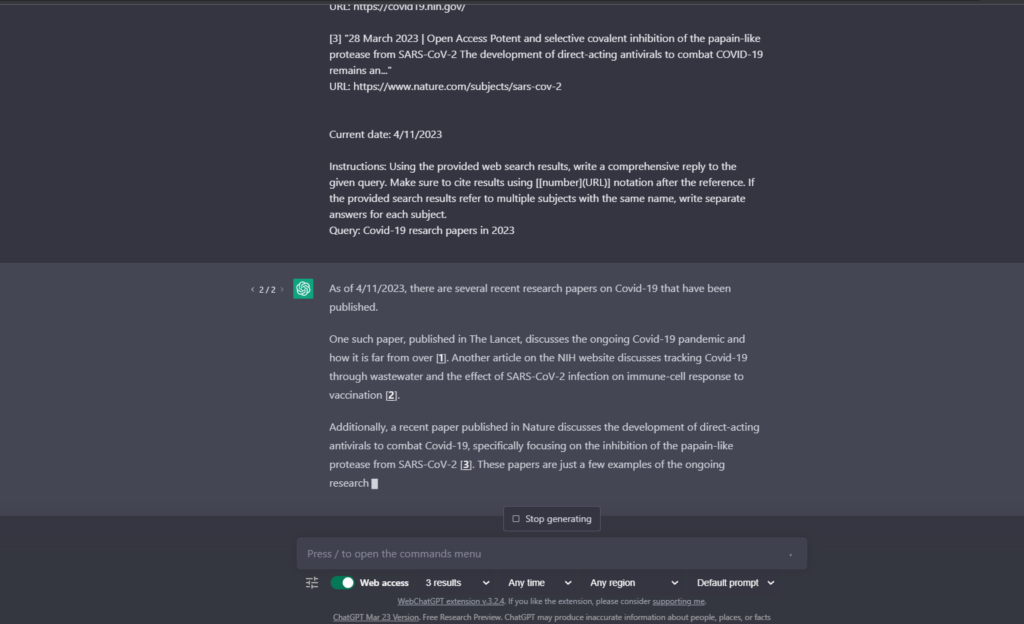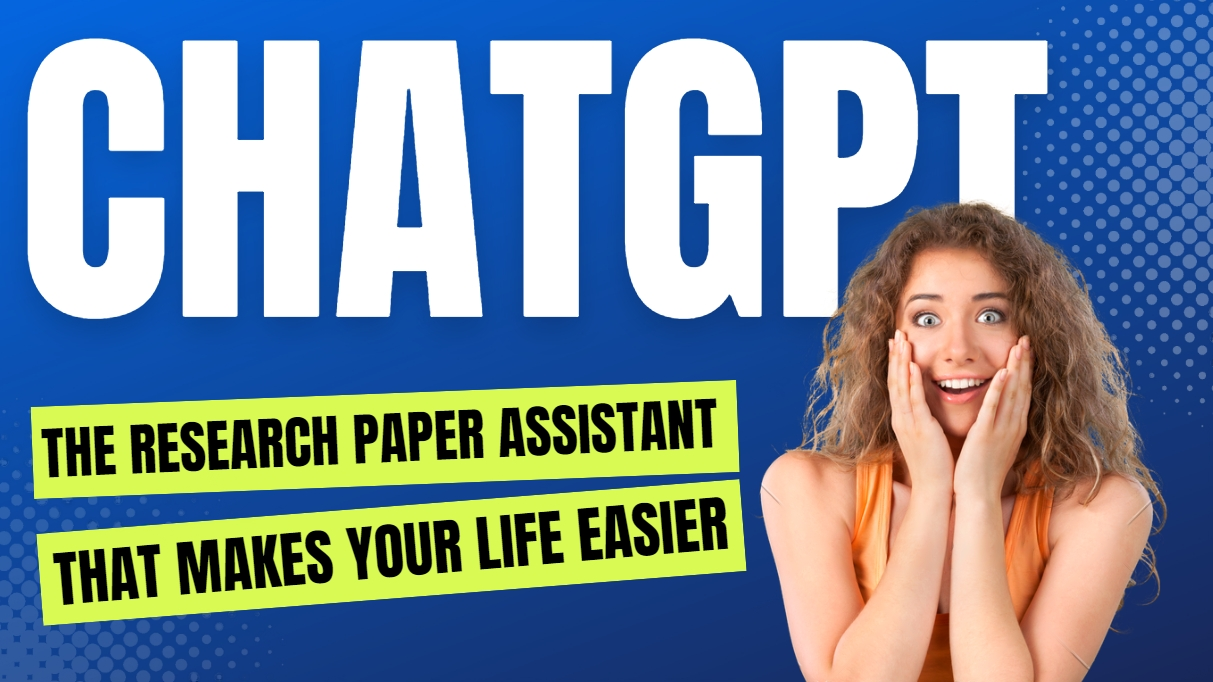- By - Gaurav Masand
- Posted on
- Posted in AI, ChatBOT, Rresearch, technology
- 5 Comments
ChatGPT: The Future of Research Paper Writing
Introduction:
Are you tired of outdated and irrelevant references in your research papers? Look no further than ChatGPT! Our cutting-edge technology offers a range of features designed to revolutionize your writing experience. From real-time data to tailored search results, ChatGPT makes writing and referencing easier, faster, and more accurate.
One of ChatGPT’s most exciting features is the inclusion of real-time data from 2023. You can now add recent papers as references to your work, ensuring that you always have access to the most up-to-date and relevant information available. Our reference database is extensive, covering a range of scientific sources across all subjects. You can also search for real-time reference papers that are constantly updated, guaranteeing that your work is based on the latest research.
ChatGPT offers more accurate results than traditional search engines, which often return irrelevant or outdated information. With our novel search methods, you can get multiple results that are tailored to your specific needs and preferences. You can even select your preferred region and choose the date of the research paper upload to further refine your search.
ChatGPT automatically detects and filters out duplicate references, including links to sources in your paper, saving you valuable time and effort. With our technology, you can eliminate the risk of repetition and ensure that your work is accurate and impactful.

How to enable these new features in ChatGPT:
Step 1: Open Google Chrome First, if you don’t already have it installed, you can download it for free from the Google Chrome website.
Step 2: Then, go to the Chrome Web Store, navigate to the Chrome Web Store by typing “chrome://extensions/” into the address bar or by clicking on the three vertical dots in the top right corner of the browser and then selecting “More tools” followed by “Extensions.”
Step 3: Once you’re in the Chrome Web Store, search for the “WebChatGPT: ChatGPT with internet access” plugin. You can either type the name of the plugin into the search bar, or navigate directly to the plugin’s page using the following link: https://chrome.google.com/webstore/detail/webchatgpt-chatgpt-with-i/lpfemeioodjbpieminkklglpmhlngfcn/related

Step 4: Once you’ve found the WebChatGPT plugin, click the “Add to Chrome” button to install it. You may be asked to confirm that you want to add the plugin to your browser – if so, click “Add extension” to proceed.
Step 5: Now, you can access ChatGPT by clicking on the ChatGPT icon that appears in the top right corner of your browser. You’ll be taken to a chat interface where you can enter your research paper topic, keywords, or questions of choice.
Step 6: Once you’ve entered your search query, you can customize your search preferences by selecting your preferred region and choosing the date range of the research paper upload. This will help refine your results and ensure that you’re accessing the most relevant information available.
Step 7: You can enjoy a range of features that will help you revolutionize your research paper writing. You’ll have access to real-time data from 2023, real-time reference papers, and accurate, relevant results that are tailored to your specific needs and preferences. You can avoid repetition in your references and access links to your sources, all with ease.
Overall, the WebChatGPT plugin is a powerful tool that can help you take your research paper writing to the next level. By following these steps, you’ll be able to install the plugin and start exploring the world of ChatGPT in no time!

Features of ChatGPT for research:
Summarize research papers using link/URL/DOI: –
- With the ChatGPT, you can provide a link to a research paper and ask it to summarize the paper for you. However, it’s important to note that the link, url or DOI must be accompanied with title and author for ChatGPT to work properly. If the link only provides the abstract or other information, the model may not be able to summarize the paper accurately.
- To use ChatGPT to summarize a research paper, you can follow these steps:
- Find link/url/DOI for a research paper
- Copy the link of the paper.
- Open ChatGPT and provide the link along with title and authors of the paper to the model.
- Ask ChatGPT to summarize the paper for you.
- Review the summary to ensure it accurately captures the main points of the paper.
- ChatGPT is capable of summarizing research papers from a wide range of fields, including science, technology, engineering, and mathematics (STEM), as well as social sciences and humanities.
- However, it’s important to keep in mind that ChatGPT is still a machine learning model, and as such, it may not always provide perfect summaries. It’s always a good idea to double-check the summary against the original paper and make any necessary edits or corrections.
Paraphrasing:
- ChatGPT can generate multiple versions of the same idea in a matter of seconds, which can save time and efforts for researchers.
- These paraphrases can help non-native speakers to understand and rephrase complex concepts in English.
- Researchers can use the different paraphrases to avoid plagiarism or to reword sections of their papers to improve the clarity of their writing.
Source retrieval:
- ChatGPT can retrieve relevant sources and citations based on the prompts given by the researcher.
- This feature can help researchers to identify key papers or articles on a topic that they may have missed otherwise.
- ChatGPT’s ability to provide sources and references using webchatGPT can also help to speed up the research process, allowing researchers to quickly gather the information they need.
Personalized responses:
- ChatGPT can be trained on specific data sets or given personalized prompts, allowing it to generate responses that are tailored to a particular research topic or question.
- This feature can be particularly useful for researchers who are studying a niche area or who have specific research questions that require specialized knowledge.
- By using ChatGPT to generate personalized responses, researchers can save time and effort while also improving the quality of their research.
Features of WebChatGPT for research:
Internet access:
Improving ChatGPT’s Abilities with a New Plugin
With the integration of a new plugin, ChatGPT can now access and retrieve information from the internet. This feature enables users to ask a broader range of questions and receive more precise responses than ever before. By quickly and efficiently searching through vast amounts of online data, ChatGPT can provide users with the most up-to-date and relevant information available. With this new functionality, ChatGPT’s capabilities as a language model are significantly enhanced, making it a powerful tool for users seeking to expand their knowledge and find solutions to their problems.
Expanding ChatGPT’s Knowledge with a New Plugin
The integration of a new plugin has significantly expanded ChatGPT’s capabilities, allowing it to access and retrieve data from the internet. This new feature enables users to ask a broader range of questions and receive more detailed and accurate responses. By efficiently searching through vast amounts of online information, ChatGPT can provide users with the most up-to-date and relevant answers possible. With this new functionality, ChatGPT becomes an even more powerful tool for users looking to expand their knowledge and find solutions to their problems.
The Benefits of a New Plugin for ChatGPT
With the installation of a new plugin, ChatGPT’s abilities are significantly enhanced. The plugin enables ChatGPT to access and retrieve data from the internet, giving users access to a broader range of information. By quickly and efficiently searching through vast amounts of online data, ChatGPT can provide users with more detailed and accurate responses. This new functionality makes ChatGPT an even more powerful tool for users seeking to expand their knowledge and find solutions to their problems.
Improving User Experience with a New Plugin for ChatGPT
The integration of a new plugin has greatly improved the user experience with ChatGPT. With the ability to access and retrieve data from the internet, users can ask a wider range of questions and receive more detailed and accurate responses. By searching through vast amounts of online information, ChatGPT can provide users with the most up-to-date and relevant answers possible. This new functionality makes ChatGPT an even more powerful tool for users looking to expand their knowledge and find solutions to their problems.
Real-time data of 2023 for reference inclusion:
- The WebChatGPT plugin provides users with access to real-time data from 2023, allowing them to stay up-to-date with the latest developments in their field of study.
- With this real-time data, users can have confidence in the accuracy and relevance of the information they are accessing.
- In addition to real-time data, the plugin also offers real-time reference papers, providing users with access to high-quality sources to support their research.
- This feature saves users time by eliminating the need to go through large volumes of irrelevant information in search of useful sources.
- By using real-time reference papers, users can be sure that they are accessing the most current and reliable sources available.
- This feature can be particularly helpful for those working on research projects with tight deadlines or limited access to physical libraries.
- With the WebChatGPT plugin, users can streamline their research process and achieve better results in less time.
More accurate results: The plugin uses advanced algorithms to deliver accurate, relevant results that are tailored to your specific needs and preferences. This means that you can be confident that you’re accessing the most relevant information available, without having to spend hours manually filtering through search results.
Multiple results: With WebChatGPT, you’ll be able to access multiple results for your search query, giving you a range of options to choose from. This means that you can find the sources that best support your research paper, without having to settle for subpar options.
Customizable search preferences: The plugin also allows you to customize your search preferences, including your preferred region and the date range of the research paper upload. This allows you to refine your results and ensure that you’re accessing the most relevant information available.
No repetition: Another key feature of the plugin is its ability to avoid repetition in your references. This means that you can be confident that you’re citing all relevant sources without including duplicate information.
Inclusion of links: With WebChatGPT, you can also include links to your sources, making it easy for your readers to access the original materials that you used to support your research paper.
Useful in all browsers: Finally, the WebChatGPT plugin is compatible with all major web browsers, including Google Chrome, Firefox, and Safari. This means that you can use the plugin on any device, regardless of which browser you prefer.
Overall, the WebChatGPT plugin is a powerful tool that can help you take your research paper writing to the next level. With its advanced algorithms, customizable search preferences, and real-time data and reference papers, you can be confident that you’re accessing the most accurate and relevant information available, without having to spend hours manually searching for sources.
.

ℹ️ FAQ (Frequently Asked Questions):
🤔 What is WebChatGPT and how does it work?
👉 WebChatGPT is a browser extension that allows users to chat with an AI language model called ChatGPT directly from their browser. It uses the DuckDuckGo search engine to gather data and can also extract webpage text from URLs. The extension works locally within the browser without the need for a backend server.
🤔 Why does the extension need access to all websites?
👉 The extension requires access to all websites because it operates locally within the browser and there is no backend server to process web requests. It uses DuckDuckGo for web searches and URL text extraction from any website. This is why access to all websites permission is required.
🤔 What should I do if the toolbar does not show up?
👉 If you are experiencing issues with the toolbar not showing up, it could be due to other ChatGPT extensions interfering with WebChatGPT. Try disabling any other ChatGPT extensions you have installed and reloading the page. If you continue to experience issues, please reach out to the support team on their Discord server at https://discord.gg/nmCjvyVpnB for assistance.
🤔 Can I use other search engines with this extension?
👉 The extension currently only supports web searching using the DuckDuckGo search engine. However, users can use DuckDuckGo bangs to get search results from thousands of other websites. You can find the full list of available bangs on the DuckDuckGo website – https://duckduckgo.com/bangs. Simply type the bang followed by your search query to perform the search on the corresponding website.
🤔 Does the extension collect user data?
👉 No, WebChatGPT is an open-source project, and the team behind it does not collect any user data or analytics. The source code is publicly available for anyone to review and contribute to on GitHub at https://github.com/qunash/chatgpt-advanced.
Summary:
The article introduces WebChatGPT, a tool designed to revolutionize research paper writing. WebChatGPT offers real-time data from 2023, extensive scientific reference sources across all subjects, and advanced algorithms for more accurate search results. The tool eliminates repetition by detecting and filtering out duplicate references, and includes links to sources in the paper, saving time and effort. The WebChatGPT plugin is used to access ChatGPT, and users can customize their search preferences. ChatGPT can also summarize research papers from a variety of fields but may not always provide perfect summaries.
Conclusion:
In conclusion, ChatGPT is a powerful tool that can revolutionize the way you write and reference your research papers. With its advanced algorithms, real-time data, and extensive reference database, ChatGPT offers more accurate and up-to-date results than traditional search engines. The WebChatGPT plugin allows you to easily access all of ChatGPT’s features, including the ability to summarize research papers, eliminate repetition, and provide links to sources. While ChatGPT is still a machine learning model and may not always provide perfect results, it can greatly enhance the accuracy and efficiency of your research paper writing. By following the steps outlined in this article, you can start using ChatGPT today and take your research paper writing to the next level.









Prof. Dr. Mohamed Alkhuzamy Aziz
Great, thanks a lot.
Carlos
Sorry but data base from ChapGPT is ONLY available until 2021 not 2023. That is a mistake.
Gaurav Masand
Carlos, if you will ask it to give references from 2023, then with the help of WebChatGPT you will get the references from 2023. Enjoy chatGPT….
Zarejestruj sie
Your point of view caught my eye and was very interesting. Thanks. I have a question for you.
Iscriviti per ottenere 100 USDT
Thank you for your sharing. I am worried that I lack creative ideas. It is your article that makes me full of hope. Thank you. But, I have a question, can you help me?